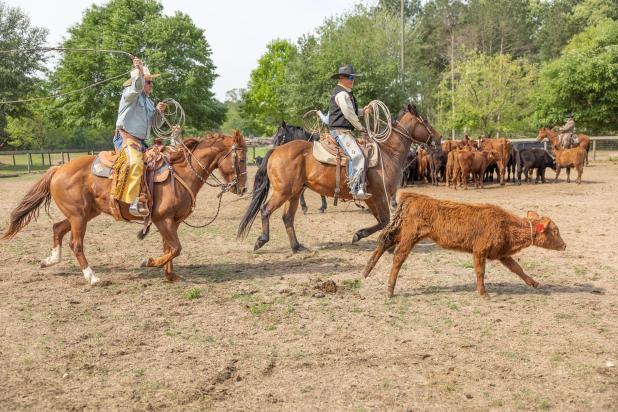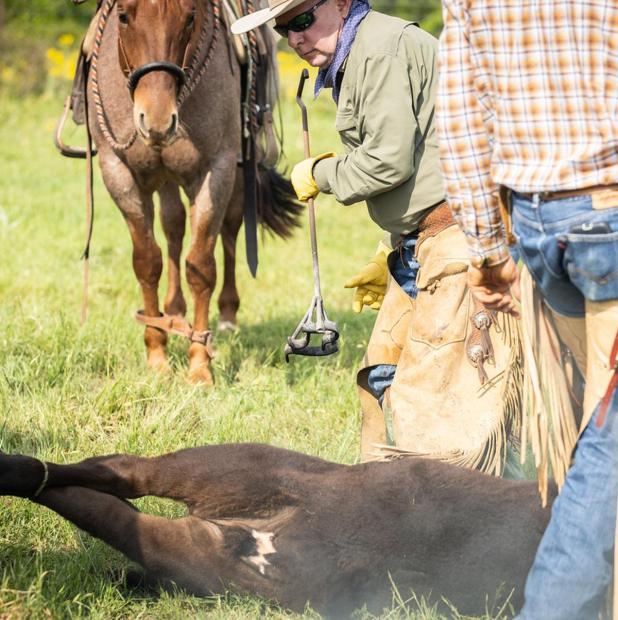
Luther Winch (left) gets ready to rope a calf with the help of a friend.

Luther Winch gets ready to brand a calf.
Abbeville's Luther Winch: Cajun Cowboy turns into a Texas Rancher
The Abbeville Meridional sat with Abbeville native Luther Winch to learn about his ranch and cattle business in Montgomery, Texas (50 miles northwest of Houston).
Winch, 61, has been married to Therese Broussard Winch since 1990, and they have two sons. Luther L Winch, IV. “Luke” is 28 years old and helps manage the ranch businesses. Rome Benjamin Winch is 25 years old. The Winches own and operate WINCH Ranch.
Are you a cowboy?
I consider myself a cowboy from Louisiana! I will always stay true to my Louisiana heritage, but I am fearless to improve and learn from other stockmen around the country and the globe. I am a resident of Texas and I expect to be buried in Texas. Some of my most memorable times have been spent out on ranches out West, where most of the cowboys are from somewhere else. I think as well all mature we can better appreciate and understand each other. I like hearing stories about mountain lions in Idaho, and in Nevada and Arizona, they love hearing my snake and alligator stories. Texas gave me an opportunity as a young man, and I am forever grateful, but I will never let go of my Louisiana roots. No matter where I range, I am a Cajun. I am a Cowboy.”
Q: How many ranches do the Winch family own, and where are they located?
We have three ranches in Texas and two in Louisiana. Our headquarters are in Montogomery. We lease pastures in Avoyelles Parish, LA, and Jefferson Davis Parish, Louisiana. We have a combined 5,000 acres.
How long have you had your ranches?
The first ranch, our home and headquarters, was acquired in 1996 when Luke was a baby. It was pure wilderness thicket. W spent years clearing and improving the land; now, it is a Jewel. We nick-named it “Cajun Creek” for the creek that runs across the East end.
How many heads of cattle do you have?
That varies with the weather and grass conditions. Currently, we are running about 700 head. Our capacity is 1,000 heads; we have run as many as 2,500 heads through the peak grazing seasons in better-than-normal conditions.
How long have you been in the cattle business?
Since I was born in 1962, my grandfather, Luther Winch Sr, had given each grandchild a heifer calf when they were born to hopefully start a savings account or use it for continuing education. I had bad luck with the heifer selected for me. Even though she was beautiful, she never bore a calf. From this humble beginning, we have built a substantial cattle operation—I guess this proves that you should never give up!
What type of cattle do you raise?
In Texas, we predominantly raise Angus cattle. These cattle are called “Beef Company Cattle” because their genetics are engineered to produce prime beef.
In Louisiana, we raise crossbred cattle, most have a bit of Brahman influence, American Reds {Santa Gertrudis X Red Angus], Santa Gertrudis X Horned Hereford, Ultra Blacks, and a variety of F1’s {First Crosses of two different purebreds}.
Our objective is to have all red hided cattle in Louisiana. The reason for this is the red color allows them to be cooler in the heat of the summer. Brahman-influenced females are able to better survive the heat, humidity, and insects, but they are less fertile than English breeds, and their calves do not grade as well as our Angus cattle. So, one day soon, I hope you can visit the ranches and see Red Angus females with cute little black and red calves by their sides. For the bulls, we exclusively use 100% Registered Angus, and most of these bulls are in the top 1% for genetics relating to marbling and other Carcass merits. Our ambition is to raise cattle that will produce 90+% prime Angus beef, and we are not far off that mark now.
I see you now sell meat from the cattle you raise. How did you get into the business of selling your meat?
WINCH Ranch, LLC is a verified natural beef producer. A third-party organization verifies us as IMI Global, a company division called “Where Food Comes From.”
We are also Angus Certified and are a founding member of CARE, which focuses on cattle ranchers who handle their cattle most humanely and use best practices to sustain and improve the environment. Ultimately, the ranch, the land, is what is most precious. She will reflect on how well of a job we are doing. Cattle trends come and go, but the land always remains.
Therese and I are both fifth-generation ranchers from South Louisiana. Our families raised and sold large numbers of cattle through the 1970s, when the market collapsed. We all stayed with the tough times and held out long enough for the markets to return to profitability.
After we began operating our “Cajun Creek” ranch in Montgomery, we began testing the quality of our beef against what was available in the local marketplace. Then, we started doing blind taste tests with our friends and neighbors. We would buy steaks from the best-known national brands, such as size, dimension, and grade. Usually, there were Four Brands in total; we had one of the four. I would prepare them side by side and place them on a platter for our taste testers. Sometimes, there were four testers. Other times, there were 10 or more. I would hand them a paper form and ask them to rank each steak bite based on - taste, texture, juiciness, and overall experience….When we were continually successful, I looked over and smiled at Therese and said “It’s time to take this show on the road and offer this beef to the public and put our WINCH Beef name on it!”
What are the benefits of buying meat from Winch Beef Company instead of the local grocery store?
The benefit of buying WINCH Beef is knowing where your beef comes from. We put our family name on the Label! We love to be transparent, that what helps our business grow…
Our beef is: Filled with Flavor, Healthy, Prime, Verified Natural Beef which has top genetics in the Angus Breed for marbling and other Carcass Merits. Our feed is all vegetarian, obviously from the grasses and hay to the local feed mill which sells us the bulk grain.
Most important is how we handle the cattle; on our steers’ last day, he will quickly load and walk off the trailer to the processor’s plant where his gift, his beef, is packaged to provide nutritious, delicious food for families, individuals, and restaurants. We do not send our cattle off to be fed; maybe one day we will have to, but for now, we manage and control all stages of the beef calves’ development, in some cases from genetic selection to growing to feed and sales. The animal processing and packing are carried out by only USDA inspected facilities. We use three plants now, two in Central and South Texas and one in Eunice, called Coastal Plains Meat Company; the Chief Operating Officer, Chip Perrin, happens to be from Abbeville and has become a personal friend. Chip and his team are essential to the success of WINCH Beef Company.
How can someone in Abbeville purchase your beef?
Call me! Text me! Send me an email or visit our website www.winchranch.com
We have an online store, please have a look!
What is the future of the cattle industry?
I don’t know. As long as the consumer would like to have a nice steak or a burger, the cattle industry will exist. There is a lot of pressure on the land we use for ranching. Housing projects and urban sprawl have displaced lots of cattle. Droughts, fires, hurricanes, and diseases have taken a lot of livestock out of production. Although I would like to feed our nation’s people with our nation’s beef, International imports will be part of our future beef supply. Winch Ranch’s future will be to continually improve our cattle genetics and improve the lands where we operate, so hopefully, one day, we may have a successor to say, “I’m a tenth-generation rancher.
What is your favorite part about being a cattle farmer?
Well, I’m not a cattle farmer…I may do a bit of farming to grow winter grass. I am a rancher. I am on horseback most days, checking the herds, fixing roads, bridges, and fences, doctoring cattle that need it, buying replacements, hauling off culls, tending to the feedlot pastures, helping a young heifer have her first calf, hauling hay overnight, tending to the grasses in each pasture, driving, lots of driving. This sounds hard and maybe impossible, but I love it, absolutely love it, and will continue until the Good Lord says, “Son, it’s time to coil your rope”…
I have a lot of favorites: Being on horseback and seeing the sunrise. Watching Therese and the boys gather and work a set of cattle the way I’ve taught them. Roping a bull that’s twice the size of my horse. Penning a set of wild yearlings alone at dusk. Having a beer with the cowboys at the end of the day. I ride a young horse and watch him improve to become a fine bridle horse, which I take lots of pride in. Driving on the interstate hauling cattle and watching the children staring at them with big smiles. Stopping for fuel at a truck stop and a mother walks up to ask if her child can touch my horses. This is the big one. I’m in public, probably tired and dirty from a day’s work, and I’ll hear a parent say, “Look honey, there’s a real cowboy.”
All I can do is smile and nod. Then, I got back in my truck or horse and realized there were thousands of better examples of cowboys than I was. Real Cowboys don’t seek attention.
